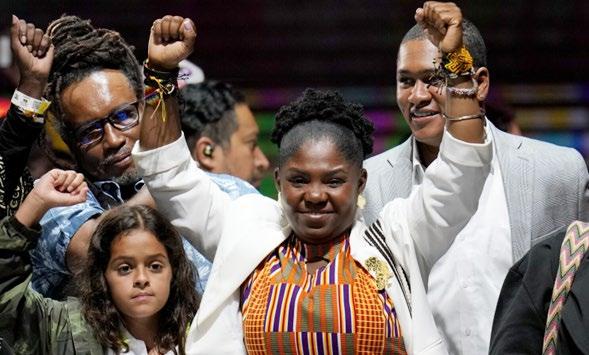
4 minute read
“Living in Peace is Living with Flavor”
WITH FLAVOR”
Taken from: https:// www.latimes. com/espanol/ internacional/ articulo/2022-06-20/ francia-marquezla-primeravicepresidenta-afrode-colombia
In this article, we explore the change from Duque’s government to Petro’s and present three key challenges to advancing peace with women and LGBTQ individuals in this new scenario.
TEXT: COLOMBIA DIVERSA
F
ollowing a heated electoral contest, the Gustavo Petro and Francia Márquez ticket was elected to the offices of President and Vice President for the period 2022 through 2026. The results of these elections mark a significant change from the outgoing government of Iván Duque. During his administration, Duque showed clear disdain for issues relating to gender and peace. This translated to a slow down in the implementation of
the gender-based measures contained in the Final Accord since mid-2018, as has been reported by the Grupo del Género y la Paz (2021).
The lack of political will on the part of Duque’s administration has worsened the conflict in some territories, affecting the safety of lesbian, bisexual, and trans leaders and human rights defenders. In spite of this, Colombia Diversa has managed to consolidate alliances with women’s organizations and position the demands of LGBT individuals before the Comprehensive System of Truth, Justice, Reparations, and No-Repetition (SIVJRNR for its initials in Spanish), thereby improving conditions for the participation, leadership, and advocacy of LBT women in peacebuilding spaces.
We have identified three major challenges this new government faces to building an inclusive peace. The first is its ability to capitalize on the opportunity represented by the election of a progressive government which, at least formally, includes women’s and LGBT issues and peace in its discourse and agenda. This change, compared with Duque’s administration, is key to resuming the implementation of the Final Peace Accord (FPA) and increasing security efforts so that LBT women can actively participate in peacebuilding in their territories. The plan outlined by Petro’s administration situates peace as a transversal issue, including it in the chapter focused on women as well as the one dedicated to peace; peace is also referenced in a few specific pledges for LGBTIQ+ individuals. Likewise, it proposes an intersectional approach that recognizes the ethnic, cultural, sexual, gender, life cycle, and income-level diversity of women; yet it is not yet clear how this administration plans to ensure the inclusion of a gender-based approach in the FPA’s implementation nor which methods and indicators will be used to monitor measures for LGBT individuals. This is a political opportunity to strengthen civil society monitoring of implementation of the FPA.
The second challenge is to ensure that Vice President Francia Márquez’s role is not merely symbolic. In Colombia, the office of Vice President has historically not represented a political role with sufficient influence to make decisions
within the administration. In this case, however, Márquez—who obtained a considerable number of votes in the Pacto Histórico primary and represents historically marginalized sectors of society—mobilized votes with the hope for a change toward a better life (Vivir sabroso, or Living with Flavor) for the majority based on gender, territorial, and ethnic-cultural reasoning. This is moment to talk about the needs of women and LGBTQ individuals with an intersectional perspective, yet there exists a latent risk that the Vice President—both as figure and what she represents—will be instrumentalized, which is why it is important to exert pressure on the president so that his administration truly incorporates what the Vice President has to offer.
The third challenge is to safeguard advances in the recognition and protection of the rights of LGBTQ persons against possible rollbacks. While the new government has claimed to be progressive and inclusive, it has been willing to form alliances that may put the rights won for LGBTQ individuals at risk. For example, during his campaign, Petro formed alliances with several evangelical sectors and traditional parties such as the Conservative Party to ensure greater governing power. Additionally, although women occupy an important place in his government plan, this inclusion has primarily been given through a binary perspective of cisgender, heterosexual women. For this reason, it is more likely that in the event he must make concessions, Petro will use the interests of LGBT persons, rather than cis-heterosexual women, as a bargaining chip.
Consideration for these challenges is key to adapting our advocacy strategies, since beyond this current administration, the work carried out by civil society organizations is essential for building a more just and inclusive society and for the transformation of the lived realities of women and LGBTQ persons into ones that enable the consolidation of peace. FM
Beyond the current administration, civil society is key to building a more just, inclusive, and peaceful society.
Reference
Grupo de Género en la Paz (GPAZ) (2021). La paz avanza con las mujeres. III Informe de observaciones sobre los avances en la implementación del enfoque de género del Acuerdo de Paz. GPAZ. https://generoypaz.co/informes/ gpaz_informe_2021.pdf










